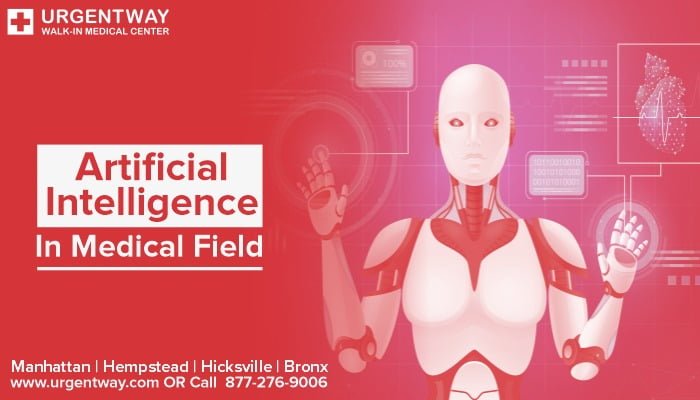Artificial intelligence involves utilizing a computer to perform and execute a task that humans typically perform. Artificial intelligence in all sectors, from banking to healthcare, saves our money and reduces our time. Artificial intelligence can help doctors make better data-driven decisions, increase disease diagnosis efficiency, integrate information, reduce unnecessary hospital visits and develop time-saving administrative duties. The success of artificial intelligence in healthcare can be attributed to the fast-growing accessibility of healthcare data, combined with the rapid development of analytic methods in big data. Artificial intelligence in healthcare simplifies the life of healthcare professionals and hospital administration by performing tasks more effectively, efficiently, and at a low cost. For example, artificial intelligence is used to determine the links between genetic codes, drive surgery-assisting robots, and maximize hospital efficiency. Incomplete medical histories and lack of storage data led to diagnostic errors and eventually death in the past. So, the use of artificial intelligence in healthcare will shine the medical industry and save human life.
Types of artificial intelligence
There are two basic types of artificial intelligence, and both are used widely in the medical sector.
- Machine learning
- Natural language processing
Machine learning artificial intelligence analyses structured data like genetic codes to determine the disease probability in the future. While natural language processing artificial intelligence analyses unsaturated data like clinical notes of healthcare to turn it into readable structured data.
Artificial intelligence in medical
In 2015, due to misdiagnosed illnesses and medical errors, approximately 10% of deaths occurred. To improve the diagnostic process, the implementation of artificial intelligence in the medical field is a most exciting step. Artificial intelligence makes easier the screening, diagnosis, and medical treatment of cancer and other inheritance diseases. Artificial intelligence also serves the patients by providing symptom checker facilities. Artificial intelligence in the medical sector analyzes unsaturated medical data like radiology images, genomics sequences, and patients’ medical history to give doctors an insight into a patient’s real-time needs. Artificial intelligence is now active in microscopes to scan harmful bacteria like staphylococcus and E.coli in blood samples. It takes less time in scanning than manual scanning with 95% accuracy.
Benefits of artificial intelligence in medical
Artificial intelligence is poised to become a transformational force in healthcare. Artificial intelligence has provided healthcare professionals and practitioners with tools to reduce their workload and refine their workflows. However, some of the tasks are repetitive, complex, and managed by an algorithm to provide real-time clinic decision support. There are the following distinguished benefits of artificial intelligence in the medical sector:
1) Clinical decision maker
Artificial intelligence help in making clinical decisions to diagnose patients, plan treatments, and manage population health by analyzing the real-time data and medical history of a patient. This clinical decision supports the physicians in paving the way for increased revenue potential.
2) Information sharing
Besides physician support, artificial intelligence is also helpful in information sharing with other medical professionals through instant technology. Moreover, it improves the doctor’s time with a patient by tracking the patient’s past data more accurately. Furthermore, artificial intelligence reduces the potential risks by addressing the root causes of diseases earlier.
3) Early diagnosis
Artificial intelligence now depends on only people’s names to access patients’ previous and existing health issues. By comparing the disease details, healthcare professionals can diagnose the disease early with more accuracy and zero error. For example, the artery’s cardio DL (Deep Learning) applications use artificial intelligence to provide automated, editable ventricle segmentations based on typical cardiac MRI images. More than 500 million people suffer from stroke each year, which leads to their death. Artificial intelligence invented a device for the early detection of stroke symptoms and treated them quickly. Moreover, the CT scan is also an invention of artificial intelligence in the medical field to diagnose neurological diseases and respiratory problems in the initial stage.
4) Cost-efficient
Artificial intelligence is more cost-friendly than traditional methods. Patients can visit the laboratory only a few times to get all their existing health condition information and treatment plan. In addition, artificial intelligence has reduced the manual work which is involved in specifying the biomarkers. A patient’s use of PeerWell led to significant cost reductions, including a 25 percent drop in hospital length of stay, an 80 percent increase in going home without the need for home care, and a 91 percent reduction in discharges to skilled nursing facilities. According to OECD estimations, 20% of healthcare spending is wasted globally. According to the United States of Medicine, the cost figures for the US are more than 30%. Artificial intelligence can reduce this cost by providing various treatment plans, efficient diagnosis, drug development, empowering patients, and providing online consultation.
5) Reduction in mortality rate
Artificial intelligence can improve the efficiency of disease diagnosis, management, and treatment in the healthcare industry. As a result, the mortality rate in the world is decreasing. The mortality rate due to timely diagnosis and development of drugs is reduced by up to 50% and 35% respectively. Artificial intelligence plays a vital role in drug designing, data screening, drug repurposing, and drug development, which results in the reduction of mortality rates across the globe.
Artificial intelligence can have machines perform tasks associated with the human mind- like problem-solving. The healthcare industry is evolving the technology, and artificial intelligence is becoming more prevalent. Artificial intelligence can improve healthcare by fostering preventive medicine and new drug discovery. Artificial intelligence can analyze big data sets and lead to predictive analysis, resulting in improvements in the healthcare sector. Artificial intelligence plays a crucial role in early diagnosis, timely treatment, information sharing about patients’ health status, effective decision-making, and reducing the mortality rate across the world. Artificial intelligence is not only crucial for healthcare professionals; instead, it also serves patients better by notifying their existing health conditions and future state.



